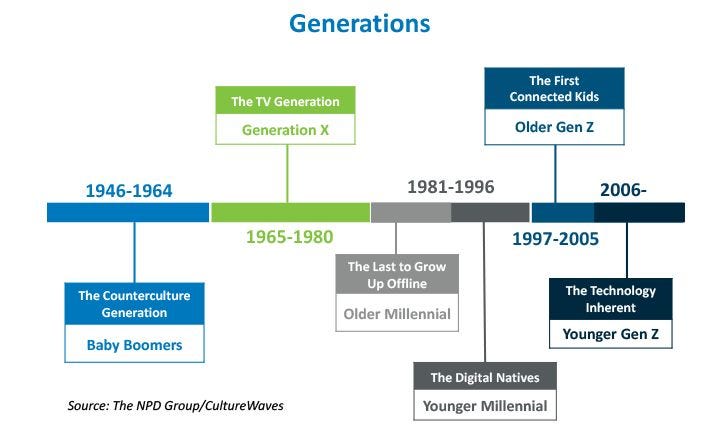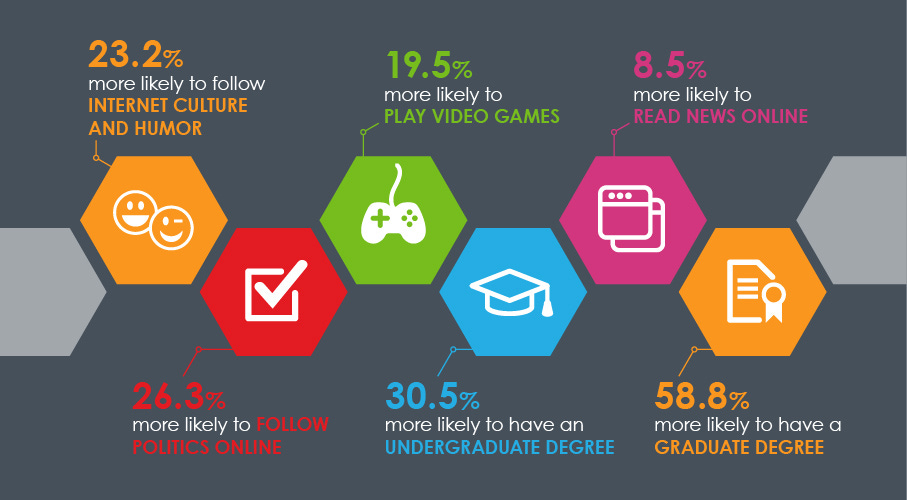Generational Clash: Challenging Fairness in the Millennial and Gen Z Work Environment
We delve into the compelling interplay between generations, as Millennials and Gen Z disrupt traditional notions of fairness and equity.
“Today’s workforce includes members of five different generations. This presents managers leading multigenerational teams with many opportunities — and even more challenges. When we fundamentally can’t relate to someone due to generational gaps, we often resort to using harmful stereotypes and blame solvable problems on each other instead of working to understand — and value — the differences that distance us.” - Emma Waldman, Harvard Business Review
The workplace is experiencing notable transformations driven by the dynamics between Millennials and Gen Z. Recent surveys reveal the shared passion for change and justice exhibited by these generations, extending to their workplace expectations. According to Forbes, Millennials and Gen Z consider diversity, equity, and inclusion (DE&I) essential factors in their professional lives.
Additionally, the Deloitte Global 2023 Gen Z and Millennial Survey provides valuable insights into the evolving relationship between work and these generations. The survey highlights the significance of work-life balance, with both Gen Z and Millennials prioritizing flexibility in their work arrangements. Financial concerns, such as the high cost of living, are also key factors impacting these generations.
As Millennials and Gen Z enter the workforce in greater numbers, they bring with them new values, expectations, and ways of working. This has led to a challenging of fairness in the workplace, as these younger generations seek to create a more equitable and inclusive environment. In this article, we will explore recent data, surveys, and opinions on this topic to provide a comprehensive overview of the current state of generational clash in the workplace.
As a Millennial, I have witnessed first-hand the generational clash in the workplace. My generation, along with Gen Z, has entered the workforce with new values, expectations, and ways of working. We are challenging traditional notions of fairness and equity, demanding more from our employers in terms of diversity, equity, and inclusion (DE&I), work/life balance, and flexibility.
From my perspective, this generational clash is not just about different ways of working or different expectations. It’s about creating a more just and equitable society. We are not content to simply accept the status quo; we want to actively work towards creating a better future for ourselves and for those who come after us.
This passion for change and justice is not always understood or appreciated by older generations. They may see us as entitled or unrealistic in our demands. But what they don’t understand is that we are not asking for special treatment; we are asking for basic fairness.
With that noted, the generational clash in the workplace is not just a passing trend. It is a reflection of deeper societal changes and a desire for a more just and equitable world. As Millennials and Gen Z continue to enter the workforce in greater numbers, it will be important for employers to listen to our concerns and work with us to create a better future for all.
Differences between Generation Z and the Millennials
Generation Z and Millennials are two demographic cohorts that have different birth years, characteristics, and perspectives. Millennials are those born between 1981 and 1996, who are the last generation to remember life before the internet and social media. They are often characterized as optimistic and self-prioritizing. Generation Z are those born between 1995 and 2012, who are the first generation to not remember a life without the internet and social media. They are often characterized as realistic and inclusive.
While Generation Z and Millennials share some similarities, such as their passion for change and justice, there are also some key differences between these two generations. One of the biggest differences is their relationship with technology. Millennials, born between 1981 and 1996, witnessed the initial boom of technology and the popular tech that later became obsolete. They experienced high pressure to attend college and pursue white-collar careers. On the other hand, Generation Z, born between 1995 and 2012, grew up with access to advanced technology, such as cell phones, the internet, and social media. They are highly aware of social, economic, and environmental issues worldwide.
These differences in their relationship with technology can have implications for how these generations approach work and life. For example, Gen Z’s proficiency with technology may give them an advantage in certain industries or roles. Additionally, their awareness of global issues may influence their career choices and values.
Again, while Generation Z and Millennials share some commonalities, there are also some key differences between these two generations. Understanding these differences can help employers create a workplace where both generations can thrive.
These differences in characteristics and perspectives can lead to clashes in the workplace as Millennials and Gen Z bring new values, expectations, and ways of working. For example, Gen Z’s focus on inclusivity may clash with Millennial’s self-prioritizing tendencies. Additionally, Gen Z’s realistic outlook may contrast with Millennial’s optimism.
Understanding the Generational Clash
Millennials and Gen Z bring their distinct characteristics, values, and expectations to the workplace, which can sometimes result in a clash. However, it is crucial to understand the factors driving these clashes to foster a fair and harmonious work environment.
According to a survey conducted by Forbes, Millennials and Gen Z share a passion for change and justice that extends to their workplace. They are driven by the desire to make a positive impact and reshape corporate America's diversity, equity, and inclusion (DE&I) agenda. This shared commitment to social causes can lead to clashes when their expectations for DE&I are not met in the workplace.
Managing multi-generational teams requires an appreciation of the unique preferences, habits, and behaviors of each generation. By challenging harmful stereotypes and creating a culture of psychological safety, organizations can establish an environment where all generations feel valued and respected.
Key characteristics, values, and expectations of Millennials and Gen Z: According to Indeed, some common characteristics of Millennials and Gen Z include being tech-savvy, socially conscious, valuing communication, and caring about their health and wellbeing. McKinsey notes that Gen Z is the first generation to grow up with the internet as a part of daily life and are known for being extremely online . Stanford News reports that Gen Z values diversity and finding their own unique identities .
Generational differences leading to clashes and potential fairness concerns in the workplace: These generational differences can lead to clashes in the workplace as Millennials and Gen Z bring new values, expectations, and ways of working. They are challenging traditional notions of fairness and equity, demanding more from their employers in terms of diversity, equity, and inclusion (DE&I), work/life balance, and flexibility.
Insights from recent surveys and studies: The Deloitte Global 2023 Gen Z and Millennial Survey found that employers have made progress since pre-pandemic times, but business is still not meeting expectations. Satisfaction with work/life balance and employer’s DEI and societal impact efforts have improved. However, the high cost of living remains a top concern for both Gen Zs and millennials .
So, to manage or address these clashes, organizations must strive to bridge the generation gap through effective communication and collaboration. This involves creating platforms for open dialogue, fostering mentorship programs that facilitate knowledge exchange between generations, and encouraging cross-generational teamwork.
Identifying The Fairness Issues
In the Millennial and Gen Z work environment, fairness concerns can arise due to differences in perspectives, expectations, and opportunities.
One significant fairness concern is the need for diversity, equity, and inclusion (DE&I) efforts to go beyond mere checkboxes. As highlighted in the Forbes survey, Millennials and Gen Z view DE&I as essential aspects they expect from their employers. Organizations must strive to create inclusive cultures that actively engage younger employees, going beyond superficial diversity initiatives.
Promoting work-life balance is another key fairness consideration. According to the Deloitte Global 2023 Gen Z and Millennial Survey, both Gen Z and Millennials prioritize flexibility in their work arrangements. They seek environments that allow them to achieve better balance between their personal and professional lives. Organizations should explore flexible work options, such as remote work and flexible schedules, to accommodate these preferences and create fair work-life balance opportunities.
Additionally, financial concerns are a significant fairness issue. The Deloitte survey revealed that many Gen Zers and Millennials live paycheck to paycheck due to the high cost of living. Economic uncertainty can hinder their financial well-being and lead to postponed life decisions. Employers should address these concerns by offering competitive compensation, financial wellness programs, and opportunities for career growth.
Here are some more details from the Deloitte Global 2023 Gen Z and Millennial Survey:
The Deloitte Global 2023 Gen Z and Millennial Survey examines the shifting relationship between work and these generations. The survey of more than 22,000 Gen Zs and millennials across 44 countries underscores continuing concerns about finances, climate change, and mental health . The survey found that employers have made progress since pre-pandemic times, but business is still not meeting expectations. Satisfaction with work/life balance and employer’s DEI and societal impact efforts have improved.
The high cost of living is the top societal concern for both Gen Zs and millennials, ahead of unemployment and climate change. Half of Gen Zs and millennials say they live paycheck to paycheck. Economic uncertainty is causing them to postpone big life decisions .
The pandemic prompted a rethinking of the role work plays in their lives. While 49% of Gen Zs and 62% of millennials say work is central to their identity, they place a strong focus on work/life balance—the top trait they admire in their peers, and their top consideration when choosing an employer. To help them achieve better balance, Gen Zs and millennials want flexibility in where and when they work .
Managing the Generational Clash
Navigating the generational clash between Millennials and Gen Z requires proactive strategies to foster understanding, collaboration, and fairness in the workplace.
Effective communication plays a vital role in bridging the generational gap. Establishing platforms for open dialogue, such as team meetings, town halls, or online forums, can facilitate the exchange of ideas and perspectives among different generations. Encouraging active listening and creating opportunities for each generation to express their viewpoints helps build mutual understanding and respect.
Mentorship programs are valuable tools for bridging the gap and promoting knowledge sharing. Pairing younger employees with experienced professionals from different generations allows for the transfer of valuable skills, insights, and guidance. It fosters a sense of support and development for Millennials and Gen Z, while also leveraging the expertise and experience of older generations.
Cross-generational teamwork is another effective approach to overcoming the generational clash. Encouraging collaboration and creating diverse project teams that include members from different generations can lead to innovative problem-solving and mutual learning. It helps break down stereotypes and allows individuals to recognize and appreciate the unique strengths and perspectives that each generation brings to the table.
It is essential for organizations to foster a culture of respect and appreciation for all generations. By avoiding favoritism and treating employees from different generations equitably, organizations can build trust and promote fairness. Recognizing and celebrating the achievements and contributions of individuals from diverse age groups reinforces a sense of inclusion and equal opportunities.
Promoting a Fair Work Environment
Creating a fair work environment necessitates a proactive stance and the adoption of inclusive practices and policies that cater to the needs of both Millennials and Gen Z.
One crucial aspect is providing opportunities for growth and development. Millennials value mentorship and appreciate organizations that invest in their professional growth. Establishing mentorship programs or coaching initiatives can help younger employees thrive and navigate their career paths. Similarly, Gen Z values ongoing learning and development opportunities. Offering training programs, workshops, and access to educational resources aligns with their desire for continuous improvement and personal growth.
Organizations should also embrace technology to enhance productivity and collaboration. Gen Z, in particular, is highly tech-savvy and values digital tools and platforms that streamline work processes. Implementing innovative technologies and communication tools can create a more efficient and connected work environment, benefiting both Millennials and Gen Z.
Diverse perspectives and inclusive decision-making are key to fostering a fair work environment. Encouraging cross-generational collaboration and soliciting input from individuals of different age groups in decision-making processes can lead to more well-rounded and effective outcomes. This ensures that the voices and perspectives of all generations are heard and valued.
Furthermore, organizations should strive to create a culture that prioritizes work-life balance and well-being. Offering flexible work arrangements, promoting a healthy work environment, and providing resources for mental health support demonstrate a commitment to the overall well-being of employees across all generations. This approach will contributes to a fair and supportive work environment.
Looking Ahead and Concluding Thoughts
As the workplace continues to evolve, it is important to stay attuned to the changing dynamics between Millennials and Gen Z. The generational clash and the pursuit of fairness are ongoing challenges that require continuous attention and adaptation.
Looking ahead, organizations should anticipate future trends and developments to ensure they remain responsive to the needs of both generations. The expectations and priorities of Millennials and Gen Z may evolve as societal and economic factors change. So, employers must be prepared to adapt their practices, policies, and approaches to maintain a fair and inclusive work environment.
Finally, achieving balance and fairness in the Millennial and Gen Z work environment is a complex but essential endeavor. Organizations can only foster harmony by actively addressing the generational clash, promoting diversity, equity, and inclusion, and providing opportunities for growth and development. And by embracing technology, encouraging cross-generational collaboration, and prioritizing work-life balance and well-being, organizations can create a fair and supportive work environment that values and engages employees from all generations.
It is only through continuous effort, open dialogue, and a commitment to understanding and appreciating the unique qualities and perspectives of each generation that organizations can build a harmonious and equitable workplace for Millennials and Gen Z.
In conclusion, the generational clash in the workplace is a complex and multifaceted issue. As more Millennials and Gen Z individuals enter the workforce, they bring with them new values, expectations, and approaches to work. These younger generations are challenging traditional notions of fairness and equity, pushing for greater diversity, equity, and inclusion (DE&I), work-life balance, and flexibility from their employers.
Recent data and surveys indicate that these concerns are not fleeting trends; they reflect profound societal changes and a genuine desire for a fairer and more equitable world. Employers who aspire to attract and retain top talent from these generations must listen to their concerns and collaborate with them to create a brighter future for everyone.
Ultimately, the generational clash in the workplace goes beyond differing work styles or expectations. It is about striving to build a society that is more just and equitable for all.
“Don’t watch the clock; do what it does. Keep going.” - Sam Levenson
This quote reminds us of the importance of perseverance. Instead of focusing on the passage of time or how long it might take to achieve our goals, we should focus on taking action and making progress. Like the clock, we should keep moving forward, one step at a time. Even when we face setbacks or challenges, we should keep going and never give up.
… Do well out there!





